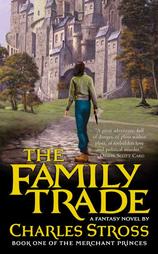I’m posting most of my RPG-related posts over on the RPG blog, but I thought I’d post one here. It’s an introductory vignette/teaser I wrote for a playtest PBeM a year or so ago. I think it gives a lot of flavour of the both the setting, and the specific adventure.
Within the ancient stone walls of Ardryr House, the kandar overlord Zartheyn Tyr has summoned his chief of security.
“So, Valneth”, said Zartheyn, “It is six days since we last spoke. Please update me on the security situation”.
“The rebels attacked us again last night”, the knight replied.
“And?”, Zartheyn asked, “What damage this time?”.
“My militia gave a good account of themselves”, said Valneth.
“You have not answered my question”. Zartheyn tried to suppress his rising anger.
“They.. attacked the village at Gavius Hill”, the knight replied, “Set fire to the barns using flamelances. And some farm workers are missing. My men extinguished the fires, and saw the rebels off”.
“Flamelances again?”, said Zartheyn, “We’re not up against regular feral humans, are we? They sound like legion deserters to me. Or worse.
Zartheyn let out an audible sigh. Valneth was his half-brother, after all, and ties of blood within the clan are supposed to run strong. He’d be in trouble with the elders if he dismissed him without good cause. But Valneth was so clearly not up to the job.
And the rebels did have to attack Gavuis Hill, of all places. It was almost as if they *knew*.
“It is probably fortunate that I have persuaded the legion to step up their border patrols”, Zartheyn continued, “I am expecting reinforcements to arrive tomorrow, and expect your full co-operation”.
“Will there be humans in the patrols they send”, asked the knight.
“They’re from Calbeyn, so that is to be expected”, Zartheyn responded, “And don’t look so disgusted. They tell me they’re sending veterans from the Zughru wars, so they’re men, kandar and human, who know how to fight. And I’m summoning their commanding officer here as soon as he arrives so that you and I can brief then on the situation. Understood? Good?”
“Yes, brother”, Valneth replied, as he turned to leave.
- - - - - - - -
“So, what have we learned?”, Brogan asked his fellow across round the campfire, “Are the Academy of Life just growing bigger and better turnips, or is there something more sinister going on?”.
“Perhaps the turnips are the sinister goings on?”, asked Qeelu, the solidly-built woman who acted as his second-in command. “Perhaps those rumours really are true”.
Brogan laughed. “What? Turnips that render humans infertile?”
“Don’t dismiss it out of hand”, Qeelu responded, “We don’t really understand the magic of the Academy of Life. Our reconnaissance did pick up a lot of Academy of Life comings and goings to and from the village”
“And the barns we torched were full of turnips”, added Grodd, a small wiry man who acted as the scout for the group. “We all know how the kandar fear the rate at which we breed”.
“You’re both expecting me to believe this nonsense”, snorted Brogan, “Turnips are cover; they have something nastier in the works”.
“Which we’re not going to find out about unless we raid their research complex at Guvil Bridge, Grodd replied, “Which is too well defended, and will bring the legion down on our heads if try a fool stunt like that”.
“And I’m no fool”, Brogan stated firmly, “Guvil Bridge is off-limits; but I know enough about the Academy of Life to know their black projects are never based at their publicly known facilities. There’s something going on at or near Gavuis Hill, that needs a stop putting to. And I intend to find out what it is”
These things are quite fun to write, and seem to an effective means of communicating elements of the setting in a way that demonstrates how they can be used in an actual game, more so than the traditional sometimes dryish info-dump.
They don’t have the form and function of complete stories, because they don’t serve quite the same purpose - they’re intended to demonstrate the potential for the stories the players themselves will create in the game.
So, if anyone cares to comment, what does the above tell you about the setting? Or the scenario? And does it make you want to find out more?
